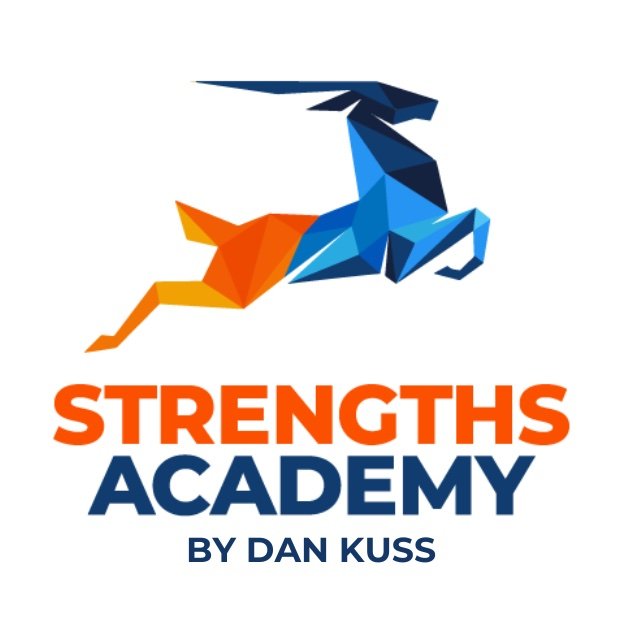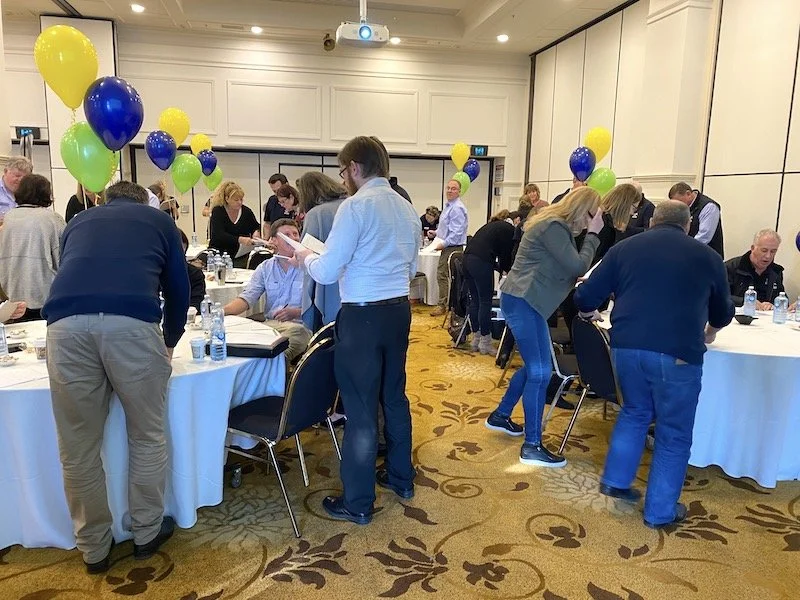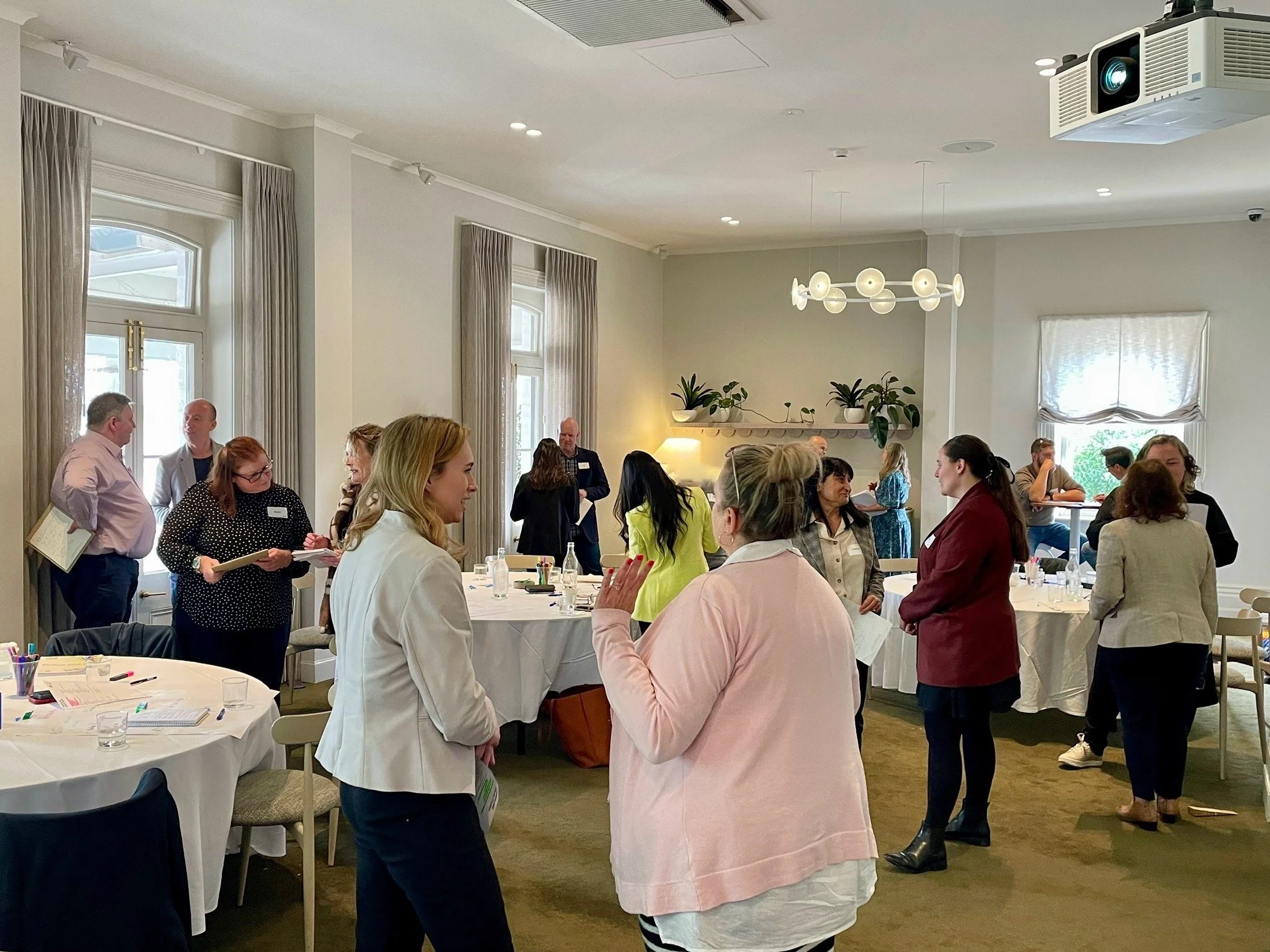
Our workshops.
Workshops and programs designed to meet the greatest challenges of your workplace and your teams.
Partner with us and choose from a series of workshops on Strengths-based Development, Values, Mindset, Resilience, Responsibility, Goalsetting and more. In our experience, we’ve seen many of the same challenges show up across different organisations and industries. Where our clients have a unique challenge, we work with them to create workshops and programs that meet their particular needs.
How we do anything is how we do everything, and our strengths run through everything we do–how we think, work, communicate, collaborate, take responsibility, achieve goals, build relationships and more. Therefore, we’ve designed these workshops with an intentional strengths-based thread to allow participants to approach these essential professional development skills from the lens of their unique strengths.
Our programs are a series of workshops designed to scaffold the learning from each topic. Flexible and customisable, programs typically spanning a six or 12-month period deliver learning outcomes across topics that address the greatest challenges of your workplace and your teams–all rooted in our Methodology.
-

Introduction to Strengths
We are all born with natural talents–those things that we do naturally well and often without thinking about it. In a world where we are told to focus on our weaknesses and work on becoming ‘well-rounded’, success by innate ability is becoming increasingly stifled.
Through the CliftonStrengths Assessment by global analytics and advice firm Gallup, we’ll help your people discover their strengths and unlock their potential. Research by Gallup finds that people who use their strengths are 6 times more likely to be engaged and productive at work, and 3 times more likely than others to have an excellent quality of life. In fact, organisations that invest in strengths-based development achieve as much as a 29% increase in profit. Building a strengths-based workplace can also help organisations increase customer engagement by up to 7% and employee engagement by up to 15%.
This workshop celebrates each individual's unique talents and strengths, and explores how each of them can leverage them to start achieving more in work and in life, on their own and in teams.
-
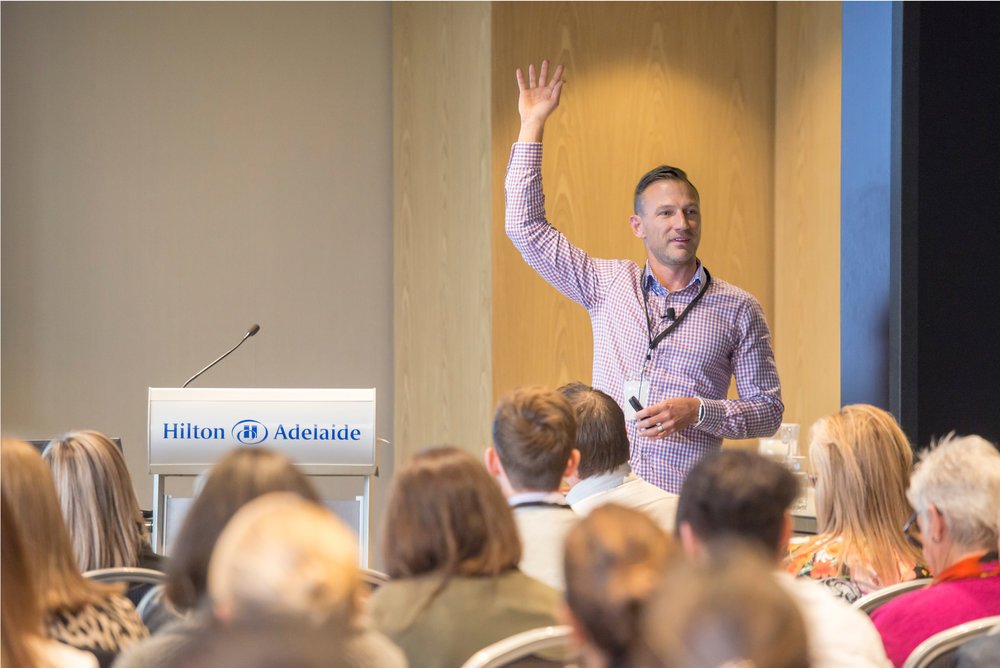
Strengths Deep Dive
The team grid, a visual representation of the collective strengths within the team, offers a clear snapshot of the team's overall composition, highlighting potential gaps and opportunities for synergy. This insight equips teams to strategically allocate tasks, delegate responsibilities, and forge partnerships based on each member's unique strengths. By aligning tasks with strengths, the team grid ensures that every individual can contribute meaningfully and authentically, resulting in heightened engagement and job satisfaction. Moreover, it nurtures a culture of appreciation, where team members recognise and leverage the diverse talents present within the group.
This leads to improved communication, problem-solving, and decision-making, ultimately driving the team towards increased productivity and success. In essence, this CliftonStrengths deep dive workshop empowers teams to harness their collective strengths, fostering an environment of collaboration, innovation, and achievement.
This workshop introduces teams to the Strengths Team Grid, where they gain a deeper understanding of their individual strengths and how they intersect with and support those of their colleagues, fostering greater teamwork and collaboration.
-

Values, Strengths & Connection
When personal values align with organisational values, a more harmonious and purposeful work environment is created. This connection fosters a shared mission and commitment among employees. The more connected we are to our organisation, the more fulfilled and meaningful our work becomes, leading to authenticity, engagement, and motivation. It also promotes trust, transparency, and ethical decision-making, enhancing the organisation's reputation and success.
Similarly, our personal values and strengths are closely linked, influencing choices, behaviours, and fulfilment. Values guide decisions, and strengths highlight our natural talents. Aligned with values, strengths become tools for expressing beliefs and contributing meaningfully. This fusion fosters authenticity, leveraging abilities for resonance and purpose, leading to meaningful success.
This workshop helps participants to recognise and embrace their values, connect them to their strengths and the organisation’s values, helping them to thrive personally and professionally while contributing to their team’s success.
-

Goalsetting for Success
Goal setting is not merely a clichéd practice; it’s a powerful tool that can propel us towards success and fulfilment in our careers and in life. In a world full of distractions and uncertainties, setting clear and meaningful goals provides us with a sense of direction, focus, and motivation. First and foremost, goal setting gives us a clear target to aim for. Imagine embarking on a journey without a destination in mind or the map to get there. How would you know which path to take or when you have truly arrived? Setting goals defines what we want to achieve, whether it's a specific career milestone, a personal accomplishment, or a life-changing experience.
By setting goals, we create a vision of our desired future, enabling us to pave the way towards it. Furthermore, the act of setting goals instils within us a sense of motivation and drive. When we have a concrete goal in mind, we are more inspired to take action and devote our energy to its achievement. By setting clear objectives and deadlines, we create a structure that holds us accountable for our progress. This helps us develop the self-discipline required to prioritise tasks, manage our time effectively, and make the necessary sacrifices for growth and progress.
This workshop helps participants to develop and deepen their understanding of the value and importance of setting goals and how to achieve them. We'll set 12-month goals that align with each team member's workplace goals and the organisation’s strategic plan.
-
Collaboration
Collaboration is essential for achieving team goals and fostering innovation. Collaboration promotes effective communication, as team members openly exchange thoughts, clarify goals, and resolve conflicts, resulting in better decision-making and problem-solving. Through collaboration, each team member has an opportunity to contribute their expertise, expanding their knowledge and skillset in the process. Additionally, working in teams fosters a sense of camaraderie, as shared achievements and shared responsibilities enhance morale and create a supportive work environment. Ultimately, collaboration in teams and cross–functional teams not only enhance productivity but also cultivates an atmosphere of shared accomplishment and mutual growth.
This workshop helps build an understanding of the dynamics of all team members and how their individual perspective, strengths, skills and expertise show up in a collaborative environment.
-

Mindset Matters
In the fast-paced and ever-changing landscape of the modern workplace, mindset plays an important role in determining an individual's success. A positive mindset can empower employees to approach challenges with resilience and a proactive attitude. It fosters collaboration and innovation, where individuals are more open to new ideas and willing to take calculated risks. Conversely, a negative mindset can hinder productivity and inhibit personal growth. It’s essential for organisations to promote a growth mindset, encouraging employees to embrace learning opportunities and view setbacks as opportunities for improvement rather than failures. By cultivating a positive and growth-oriented mindset in the workplace, individuals can transform challenges into opportunities and contribute to a thriving and dynamic work culture.
This workshop explores how our mindset shapes our perception and our actions, and ultimately our outcomes and results. Participants gain a better understanding of their brain's plasticity, begin to feel more comfortable taking risks and understand how to create less stress and greater performance.
-
Resilience at Work
The ability to handle setbacks and obstacles has become a valuable skill for individuals navigating their lives and careers. Resilient employees possess the power to bounce back from failures and view setbacks as opportunities for growth. Their optimism fuels their determination, inspiring others to approach challenges with a similar mindset. By embracing resilience, employees become catalysts for innovation, driving positive change within their organisations. Overcoming difficulties builds self-assurance and confidence, empowering individuals to take on new and ambitious projects. They become more open to stepping outside their comfort zones, actively seeking learning and growth opportunities.
Moreover, building resilience facilitates effective teamwork. By fostering an environment of support and value, resilient employees strengthen team bonds, encouraging collaboration and cohesion. This united front empowers teams to overcome obstacles together, enhancing their collective resilience.
This workshop explores the value of resilience in both work and life. Participants will learn practical tools and strategies to deal with difficult circumstances effectively. They’ll develop the mindset and skills necessary to bounce back from setbacks, view challenges as opportunities for growth, and inspire others around them.
-

Effective Communication
Effective communication is the lifeblood of a successful workplace. It’s the foundation for productivity, collaboration, and a positive work environment. When team members can clearly express their ideas and expectations, misunderstandings are minimised, and everyone is aligned towards achieving common goals. Effective communication fosters strong relationships among colleagues, enhances problem-solving capabilities, and boosts morale. It enables individuals to feel heard, understood, and valued, improving employee engagement and job satisfaction. Moreover, effective communication helps build trust among team members and facilitates the sharing of knowledge and expertise.
This workshop teaches effective communication strategies that participants can use to increase productivity, collaboration with their co-workers and a positive culture. Allowing everyone to contribute and feel confident about giving and receiving feedback.
-

Relationships: Internal & External
Behind every thriving organisation lies a web of internal and external relationships. They are the lifeblood that sustains growth, innovation, and prosperity. While many understand the significance of external relationships with clients, partners, and suppliers, the value of strong internal relationships with colleagues often goes unnoticed.
Developing a strong rapport with colleagues fosters a sense of belonging and motivates individuals to invest their time and energy into their work. When colleagues support and respect one another, it creates a positive and engaging workplace culture that inspires productivity. Furthermore, having a good working relationship with colleagues encourages the exchange of ideas, leading to fresh insights and inventive solutions.
This workshop explores why it’s important to have great relationships with both colleagues and clients, identifies what gets in the way, and shares tools and strategies for creating and fostering strong and healthy internal and external relationships.
-
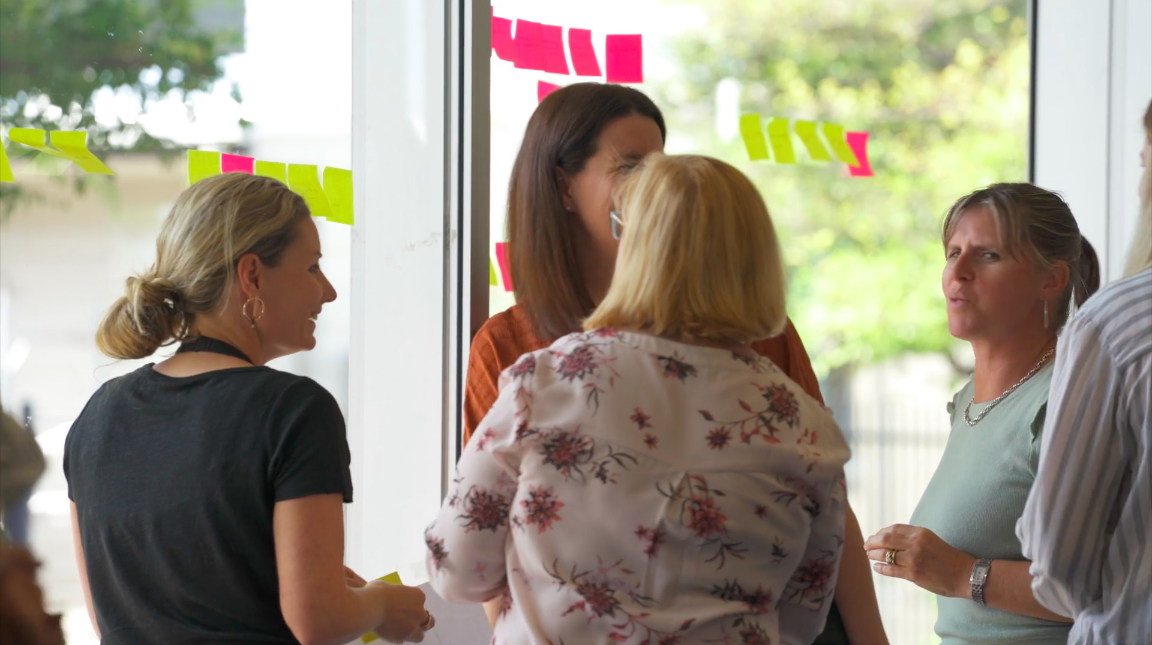
Working Smarter Not Harder
Imagine a world where you can achieve more without sacrificing your sanity or burning yourself out. This is the essence of working smarter. It's about optimising your efforts, maximising your productivity, and ultimately achieving your goals more efficiently. Gone are the days when long hours and sheer effort were considered the only pathways to achievement. Instead, individuals now understand that efficiency, strategic thinking, and leveraging available resources can often yield more significant results in less time. By analysing tasks, prioritising responsibilities, and focusing on high-value activities, individuals can optimise their productivity. This approach allows them to free up mental space, reduce stress, and find innovative solutions that were otherwise hidden in the sea of busy work. Embracing the concept of working smarter not harder ultimately leads to not only better outcomes, but also a healthier work-life balance, fostering personal growth and success.
This workshop helps participants to learn and practice tools and strategies both on a personal and team level to improve the overall time management, workflow, inter-team relations, employee productivity and focus, all while working smarter, not harder.
-

Self Responsibility
Self-responsibility in the workplace empowers individuals to take ownership of their actions, decisions, and outcomes. When employees exercise self-responsibility, they understand the importance of being reliable, accountable, and proactive. They prioritise completing tasks on time, seeking innovative solutions, and taking the initiative to tackle challenges head-on. Moreover, self-responsible individuals show dedication to their personal growth by constantly seeking opportunities to expand their skills and knowledge. By embodying self-responsibility, employees contribute to a positive work culture, foster trust among colleagues, and ultimately drive outcomes for both themselves and the organisation.
This workshop sets the foundation for taking more responsibility in our lives and workplace roles so that we can serve as a better leader for our workplace, community, and family.
-

Managing Up
A successful connection starts with confident communication, especially when working with senior colleagues and managers. This workshop empowers participants to build stronger workplace relationships by learning how to manage upwards with clarity, respect, and initiative.
Through real-world scenarios and practical tools, participants explore how to communicate effectively, negotiate with confidence, and give and receive feedback in a way that builds trust and influence. The experience strengthens self-awareness, personal responsibility, and professionalism—key to navigating complex workplace dynamics.
This isn’t just about learning soft skills—it’s about stepping into your role with purpose and maturity. Participants leave better equipped to contribute meaningfully, communicate thoughtfully, and take ownership of their growth from day one.
“The best thing for me today was learning about Growth Mindset and articulating goals. I enjoyed [the workshop] and it will springboard us into other professional development.”
—Jayne Hoffmann, HR Manager. Cabra Dominican College.
Let’s have a coffee and explore your challenges.
There’s no commitment, pressure, or obligation.
